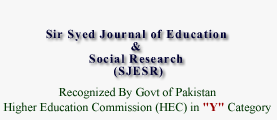Conflict of Interest in Research (COIR) — SJESR towards Transparency
COI is the Situation in which the integrity of academic activity, particularly research, maybe, or maybe perceived to be, compromised by financial or other interests. A conflict of interest occurs when a secondary interest distorts or has the potential to distort a judgment related to primary interest. Further, a professional’s judgment does not necessarily have to be biased for that researcher to have a conflict of interest- even the appearance of a conflict of interest is ethically worrisome. COI is defined as anything that can create a divided loyalty—or the appearance of one—between the researcher, the institution, and the individuals enrolled in the research. Another way of defining COI would be a situation in which circumstances that create a risk that a researcher’s professional judgments or actions regarding a primary interest [academic honesty, employee benefit, and societal responsibility] will be unduly influenced by a secondary interest [financial, professional and personal benefits]. Interests are broadly characterized into two types: financial, and conflicts of commitment.
Conflicts may be a personal relationship, association, family, friends, relationships, and other close personal links; ideological/ beliefs such as religious/political that is relevant to the work; academic such as competitors or someone whose work is critiqued; affiliation i.e. employment, on the advisory board for, or a member of an organization with an interest in the outcome of the work; financial i.e. funding, services, goods and other payments received/ anticipated or expected by author/authors relating to the subject of the work or from an organization with an interest in the outcome of the work and maybe an intellectual property i.e. patents or trademarks owned by someone or their organization.
For Authors
All manuscripts for articles, original research reports, editorials, comments, reviews, book reviews, and letters that are submitted to the journal must be accompanied by a conflict of interest disclosure statement or a declaration by the authors that they do not have any conflicts of interest to declare. All articles that are published in the journal must be accompanied by this conflict of interest disclosure statement or a statement that the authors have replied that they have no conflicts of interest to declare. If a journal prints unsigned editorials, it should not have been written by anyone with a conflict of interest. To facilitate this policy, all authors must privately disclose ‘ALL their potential conflicts of interest’ to the editors of the journal at the time of submission. These include all financial and non-financial interests and relationships with other organizations. Authors should also disclose any conflict of interest that may have influenced either the conduct or the presentation of the research to the editors, including but not limited to close relationships with those who might be helped or hurt by the publication, academic interests and rivalries, and any personal, religious or political convictions relevant to the topic at hand. In the article, the authors must include a draft statement that discloses all relevant conflicts of interest and affiliations.
For Editors and Reviewers
Editors and reviewers must reject /decline to be involved with a submission when they have a recent/current publication or submission with the author. Share or recently shared affiliations with author, collaborate, or have close relationships with the author or financial interest/gain, or feel unable to be objective. Editorial staff must not use information gained through working with manuscripts for private gain. Reviewers must declare any remaining interests in the ‘Confidential’ section of the review form, which will be considered by the editor. Reviewer(s) must declare any conflict of interest which may affect their review work. In cases of conflict of interest, the reviewer(s) are requested to notify the editorial team of their inability to review a particular research paper. Editors and peer reviewers should disclose interests that might appear to affect their ability to present or review work objectively. These might include relevant financial interests or personal, political, or religious interests, and detailed descriptions about tasks, responsibilities of all parties on how to avoid and manage COIs.










